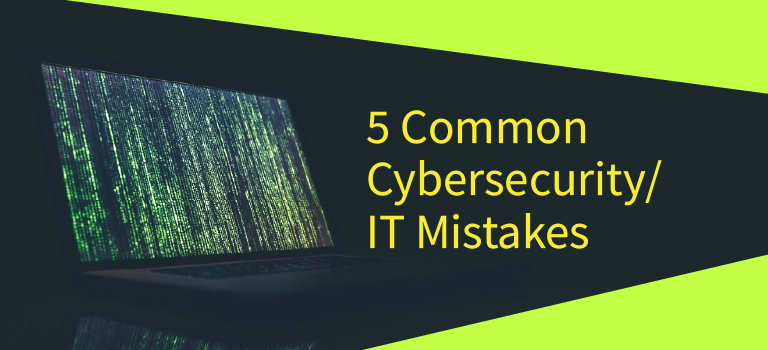The world is filled with hackers and other criminals who hunt the web for unprotected small and medium-sized businesses. Cybercriminals understand that many businesses are not equipped to manage a breach, leaving them more vulnerable to attacks and less likely to respond.
But that doesn’t mean your company has to remain passive in the fight against cybercrime. Taking practical steps and equipping your team can make the difference between suffering the devastating consequences of an attack and protecting the reputation of your company.
Below is a list of five fundamental mistakes that need to change within your small business.
Untrained Employees
Implementing security software is critical, but it does it mean that anyone on your team can take the reins of cybersecurity. You can have the most advanced software and firewall available, and your company will still be at risk of various attacks and threats. Cybersecurity is among the most critical issues, and your organization must treat it as such.
An untrained employee can neither understand nor navigate security risks and tasking a team member without adequate technical experience could spell catastrophe. Make sure anyone you put in charge is trained in your specific security needs and prioritize ongoing training in the future.
Outdated Software
Cybercriminals constantly learn modern technologies to find ways of circumventing security software, firewalls, and other systems. Software companies regularly update their products to respond to the day’s most prevalent threats, so be sure to regularly update your software to bolster your company’s data protection.
When you get an automatic security update, accept it. These updates provide patches and fix bugs to minimize your networks and systems’ vulnerabilities. But these updates only work when you install them! Don’t leave your organization more vulnerable than it needs to be.
Weak Passwords
Too many business owners and professionals neglect to take passwords seriously. Most security products and web accounts encourage you to use robust passwords that cannot easily be breached by bad hackers.
Create complex passwords. Avoid using the name of your business, year of founding, personal birthdays, address numbers, or any other words or numbers that will make it easy for bad hackers.
Also, consider implementing password-protected PDFs to secure sensitive files. PDFs are the preferred format for many business documents, and you can use an editor to modify documents, drawings, and other content without changing it from PDF format. All you must do is upload the file to a secure online location, modify it, and download it.
Neglecting to Delegate
We mentioned how important it is for the employees in your IT Department to be qualified and knowledgeable. But you also want to avoid assigning all your security responsibilities to a single IT person.
Doing so may work out fine if you run a micro-business and deeply trust the individual. Still, it’s best to delegate tasks to a team to ensure efficiency and prevent anyone from becoming overwhelmed.
Not Backing Up Data
Most organizations overlook data backups occasionally. However, backing up your system will prove well if you ever experience a breach or threat.
Say, for instance, a hacker steals your data, or an employee accidentally downloads malware. You will be able to clean the system and retrieve your file backups from storage instead of losing all valuable customer and company data.
Hackers target small businesses because these businesses are less likely to have adequate cybersecurity measures in place. If you want to protect your company’s reputation and stay on track with your goals, you must take cybersecurity seriously. Avoid the mistakes above and continue learning about how you can strengthen data security and build a bright future.
Subscribe today to the United States Cybersecurity Magazine at www.uscybersecurity.net/subscribe for more in depth information. ![]()
Gloria Martinez
Tags: Cybersecurity, Security, Small Business, Vulnerabilities


